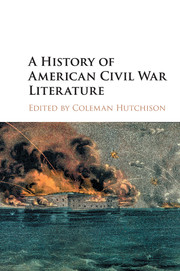Book contents
- Frontmatter
- Dedication
- Contents
- List of Illustrations
- Notes on Contributors
- Preface
- Acknowledgments
- Part I Contexts
- Part II Genres
- 6 Dépôt Culture: The Civil War and Periodical Fiction
- 7 Imitation and Resistance in Civil War Poetry and Song
- 8 Children's Literature
- 9 Writing Lives: Civil War Diaries
- 10 Civil War Memoir
- 11 Civil War Narrative History
- Part III Figures
- Recommendations for Further Reading
- Index
9 - Writing Lives: Civil War Diaries
from Part II - Genres
Published online by Cambridge University Press: 05 December 2015
- Frontmatter
- Dedication
- Contents
- List of Illustrations
- Notes on Contributors
- Preface
- Acknowledgments
- Part I Contexts
- Part II Genres
- 6 Dépôt Culture: The Civil War and Periodical Fiction
- 7 Imitation and Resistance in Civil War Poetry and Song
- 8 Children's Literature
- 9 Writing Lives: Civil War Diaries
- 10 Civil War Memoir
- 11 Civil War Narrative History
- Part III Figures
- Recommendations for Further Reading
- Index
Summary
When Walt Whitman famously proclaimed in Specimen Days that the “real war will never get in the books,” he had not envisioned how the extensive life writing produced in response to the Civil War would instantiate the abstraction of the real. He went on to speculate that the war's “interior history will not only never be written – its practicality, minutiae of deeds and passions, will never be even suggested.” Whitman implied that the collective personal experience of the war years was unrepresentable in language and that no single writer could enunciate what would always remain ineffable. But hundreds of published and unpublished diaries have challenged that pronouncement and created a national archive that reflects both the minutiae of lives and more sobering themes with which the war generation wrestled.
Sensing the historical “moment” that a civil war occasioned, soldiers, medical personnel, chaplains, farm women, well-heeled citizens, government clerks, officers’ wives, journalists, political figures, and Southern teenagers began to chronicle in earnest. Some wished to capture the heady days of social and political change for posterity, while others used the daily forum to make sense of the chaos unfolding around them. Although the diary has traditionally attracted writers with time to record the quotidian, it became a far more ecumenical genre during the Civil War. Diarists from both sections, female and male, civilian and military, rich and poor, told stories from the mundane to the poignant: of their families under emotional and economic stress; of their lives as infantrymen trying to survive illness and exposure; of their work to stoke the war machine with the riches of their larders; and as partisans justifying their ideological positions. Few gave thought to publishing their private musings, and hundreds of diaries that survived the war – even if begun long before it or continued long after it – have remained in U.S. repositories, unpublished to this day. Relatively few diarists offered up their chronicles during the war or immediately after it; those who did sought to capitalize on a widespread hunger for personal testimony from camp and field. Confederate women were the most inveterate and numerous of the war's chroniclers but lacked access to publishers. An even more powerful deterrent was that few saw the interior mindscape of diary keeping as worthy of publication.
- Type
- Chapter
- Information
- A History of American Civil War Literature , pp. 134 - 150Publisher: Cambridge University PressPrint publication year: 2015



